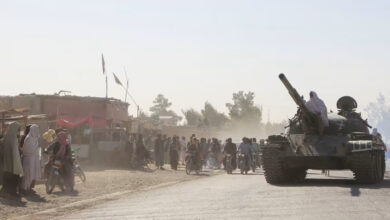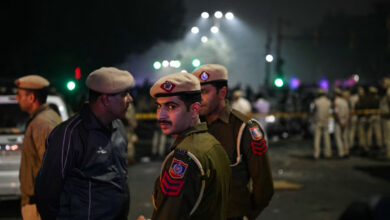Al-Qaeda released a posthumous audio recording by Osama bin Laden in which he praised revolutions sweeping through several Arab countries, and called for more Muslim "tyrants" to be toppled.
Islamists have conspicuously been absent in the uprisings in the Middle East that have largely been led by ordinary citizens angered by autocratic rule, corruption and mismanaged economies.
Al-Qaeda and other militant groups have waged bloody, but unsuccessful, campaigns to topple these same rulers. By praising the revolts, bin Laden, who was killed in a US raid on 2 May in Pakistan, appeared to be trying to make Islamists relevant again.
Al-Qaeda had said bin Laden, who masterminded the 11 September, 2001 attacks on the United States, recorded a message a week before his death. The audio was included in an Internet video more than 12 minutes-long and posted on Islamist websites.
"The sun of the revolution has risen from the Maghreb. The light of the revolution came from Tunisia. It has given the nation tranquility and made the faces of the people happy," the speaker, whose sounds like bin Laden, said.
"To the Muslim nation – we are watching with you this great historic event and share with you the joy and happiness. Congratulations for your victories and may God grant your martyrs mercy, your injured recovery and your prisoners freedom."
Tunisia's president Zine al-Abidine Ben Ali was overthrown by mass protests in January, followed by Egypt's Hosni Mubarak.
Bin Laden praised the Egyptian revolution and urged Arab protesters to maintain their momentum, adding: "I believe that the winds of change will envelope the entire Muslim world."
"This revolution was not for food and clothing. Rather, it was a revolution of glory and pride, a revolution of sacrifice and giving. It has lit the Nile's cities and its villages from its lower reaches to the top," he said.
"To those free rebels in all the countries – retain the initiative and be careful of dialogue. No meeting mid-way between the people of truth and those of deviation."
Bin Laden made no specific reference to Libya, Syria, Bahrain and Yemen, where pro-democracy protesters have had less success than in Egypt and Tunisia, but said Israel, reviled by many ordinary Arabs, was worried by the unrest.
Bin Laden called on young Arabs to consult "those of experience and honesty" and set up a framework that would allow them to "follow up events and work in parallel… to save the people that are struggling to bring down their tyrants."
But he did not mention or advocate democratic rule, which was a key demand of protesters in Egypt, Tunisia and Bahrain in particular. Al-Qaeda figures usually pour scorn on Western-style democracy which they see as contradicting Islamic values.
"Tunisia was the first but swiftly the knights of Egypt have taken a spark from the free people of Tunisia to Tahrir Square," said bin Laden, adding: "It has made the rulers worried."
US commandos killed bin Laden in a compound in Abbottabad, a garrison town near the Pakistani capital. The incident embarrassed Pakistan's military and spy agencies and led to calls by members of the US Congress for a tougher approach toward the country.
Al Jazeera television, citing Pakistani security sources, said on Wednesday that Al-Qaeda had appointed Egyptian Saif al-Adel as temporary leader following bin Laden's death, but bin Laden's number two Ayman al-Zawahiri, another Egyptian, is widely seen as best placed to take over the whole organization.
Audio and video announcements from bin Laden largely dried up in recent years while Zawahiri recorded frequent messages. But Zawahiri, an Egyptian medical doctor, is seen as lacking the charisma and oratorical skills of Saudi-born bin Laden, who has Yemeni roots.
Al-Qaeda has an active wing in Yemen but has not managed to establish itself in Egypt, the most populous Arab nation.




